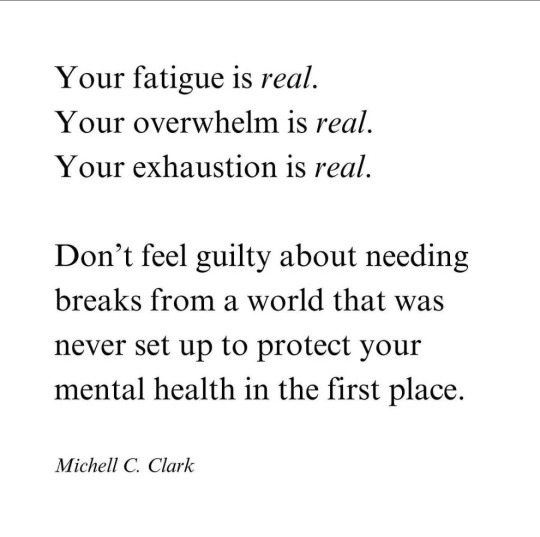#mental health awareness
Text
On the topic of NPD and "narcissistic abuse".
So, I've been a victim of a few abusive relationships. I've been starved, guilt tripped, gaslit (to the point I STILL have trouble figuring out if I'm right about something that has been confirmed several times.) And out of the few people I was hurt by, do you know how many of them were diagnosed narcissists?
One. Just one. Though, the others were autistic. Hell, even severely depressed! But I'm not out here advocating against "autistic abuse." That sounds pretty ableist, right?
So what gives you the right to do that to people who are also struggling? How would you feel if a psychiatrist or therapist told you that you were evil or could not be helped due to a disorder. How would you feel if when trying to figure yourself out and going through the symptoms, all you find are articles upon articles of how you're inherently abusive and no one should love you or give you any attention?
If someone is abusing you, it is not BECAUSE they are a narcissist. It's not BECAUSE they have a disorder you seem as uncouth or scary. And you're not wrong for being upset or angry about your abuse. You deserve to feel your feelings!!!
But when you start shooting down your fellows in struggling with mental illness, you drag us all down. You make the people you claim to care for feel unsafe.
Do better. Be better to people. Encourage people to get help if you notice dangerous or hurtful behavior. You can be hurt, but don't let your actions further hurt others and perpetuate the cycle.
#narcissistic personality disorder#npd awareness#mental health awareness#mental health advocacy#mental health#narcissistic abuse just isnt real y'all#y'all are just punching down
38 notes
·
View notes
Text
How to Talk to Someone Who is Struggling
It can be tough to talk to someone who is struggling with their mental health. We want our friends and family to feel comfortable reaching out to us, but most people aren’t actually sure how to react when that happens. I’ve heard a lot of people express fears that they might say the wrong thing or even make the situation worse. And that’s valid. It took a lot of training for me to learn how to talk to suicidal and depressed people, and they just don’t teach those skills in regular school. But having those skills can save lives.
So if you’ve got a struggling person in your life and you’re not sure how to talk to them, remember:
Don’t be afraid of using the word ‘suicide’. It’s a harsh word, and a lot of people are scared that talking about it directly might push someone to do it. It won’t. Suicidal people are thinking about suicide in explicit terms all the time; hearing the word out loud isn’t any worse than the things they’ve already been thinking. Using euphemisms and beating around the bush just makes it hard to have an honest conversation. Be direct. Say exactly what you mean. Ask your loved ones if they are thinking about killing themselves. Say the word suicide. It’s hard, but it’s important.
Don’t make the conversation all about you. It is really, really tempting to jump in and tell a struggling person all about your own struggles with mental health in order to empathize with them. Don’t do it. Not right away. You might mean well, but when you launch into your own mental health struggles, you are suddenly putting the other person in a position where they have to comfort and empathize with you, when it should be the other way around. They don’t have the energy for that right now. Let them talk about themselves first.
Don’t have an intense emotional reaction to what they’re saying. This is really, really hard, but it’s important. When someone is telling you about their self-harm or suicidal thoughts, try to keep your face and your voice as neutral as possible. Offer empathy in a calm, comforting way, and avoid crying in their presence if you can. They are watching you closely to see what’s okay and what’s not okay to disclose; if they see you getting upset at what they’re saying, they won’t want to talk about it anymore. And once again, it puts them in a position where they have to stop and comfort you.
Don’t say “I know exactly how you feel”. Because you don’t. And hearing statements like this, even if they’re well-meaning, can come across as dismissive or patronizing. Even if you’ve been in a very similar situation, you can’t really know what it feels like to be someone else, or feel the pain they feel. Instead of saying “I know what you’re going through”, validate their pain and say “I can’t imagine what you’re going through” - because you can’t.
Don’t ask “why” questions. Asking questions that start with “why” automatically puts people on the defensive. When you ask “why do you feel that way”, it makes people feel like they have to justify themselves to you. Instead, ask “what are some of the reasons you feel that way?” This is a much more non-judgmental way to phrase things, and it allows people to explain what’s going on without feeling like they’re on trial.
Don’t be afraid of silence. When someone tells you something really heavy, sometimes you just won’t know what to say. That’s okay. A lot of the time, distressed people aren’t looking for comforting words - they just need someone to sit there in their pain with them, by their side. Silences are a natural part of intense conversations, and they’re important. Let them happen. And sometimes, a long silence gives someone the space to say the things they were afraid to say before.
Don’t try to “fix” the problem. When someone comes to you with a problem - their partner dumped them, they lost their job, they’re broke - it can be really, really tempting to just start hurling solutions at them. We’ll sign you up for dating sites! We’ll spruce up your resume! We’ll make you a budget! If the person reaching out to you wanted that kind of help, they would ask for it. If they’re reaching out to talk about their problems, they aren’t looking for practical solutions right now - they don’t need you to fix it, they need you to listen to them, understand how much they’re hurting, and sit by them when they cry.
Validate their feelings. Distressed people often feel that their emotions are ridiculous, or that they don’t “deserve” to feel sad because they are better off in life than other people. Remind them that they have a right to their own feelings. Confirm that, yes, their situation sucks and it’s okay for them to be upset about it. Never confirm suicidal feelings, but do let them know that their sadness or anger or shame is okay to feel, and they have a right to feel it.
Offer resources only if they are okay with it. Pelting a suicidal person with unwanted pamphlets isn’t helpful. Even if you know a great mental health resource in your area, it’s important to ask if the person even wants resources, or feels comfortable reaching out to a resource. Always check in with the person’s comfort after providing a resource, and ask if you can help them to be more comfortable accessing this resource. If you gave them the name of a local mental health clinic, ask if they would like you to call the clinic for them, or accompany them to the clinic - offer whatever help you can, but don’t push resources, and always check in with their needs and comfort.
These tips aren’t perfect, and they won’t necessarily work for everyone - they are a guideline to get you started, and to feel more confident approaching struggling family and friends. Having intense conversations about mental health or suicide with a loved one can be overwhelming, and many people don’t feel prepared to have these conversations, even if they want to. Do your best. Even if you make mistakes, showing someone that you honestly care about them and you’re making an effort to be there for them can make a world of difference. Having an imperfect conversation is better than no conversation at all.
If you’re still having doubts about your ability to have these conversations, remember that there are helpful videos online that you can learn from, and you can always call suicide hotlines to get tips and reassurance about approaching a loved one you’re concerned about. At the end of the day, it doesn’t really matter how you have this conversation - it matters that you have it.
#mental health#mental health awareness#mental illnesses#depression#anxiety#bpd#cptsd#ptsd#bipolar#psychosis#panic disorder#schizophrenia
46 notes
·
View notes
Text

by laurenmaerie, be brave today
#brave#be brave#fight depression#mental health awareness#mentally tired#mental illness#mental health#words#love#writing#love quotes#life quotes#quoteoftheday#quote#laurenmaerie#strong#i feel so strongly about this#take care of yourself#take care of me#take care <3
24 notes
·
View notes
Text
moon?
you remind me of the moon
because every night you keep coming back :)
#aesthetic#feelings#inspiration#inspring quotes#mental health#mental health awareness#literature#life quotes#words#thoughts#poetry#poem#original poem#short poem#poems and poetry#poems and quotes#poems on tumblr#prose#heartbreak#i miss you#life#i miss him#I love you#writing#relationship#Relationship Quotes#relatable quotes#relatable#quotes#spilled ink
20 notes
·
View notes
Text
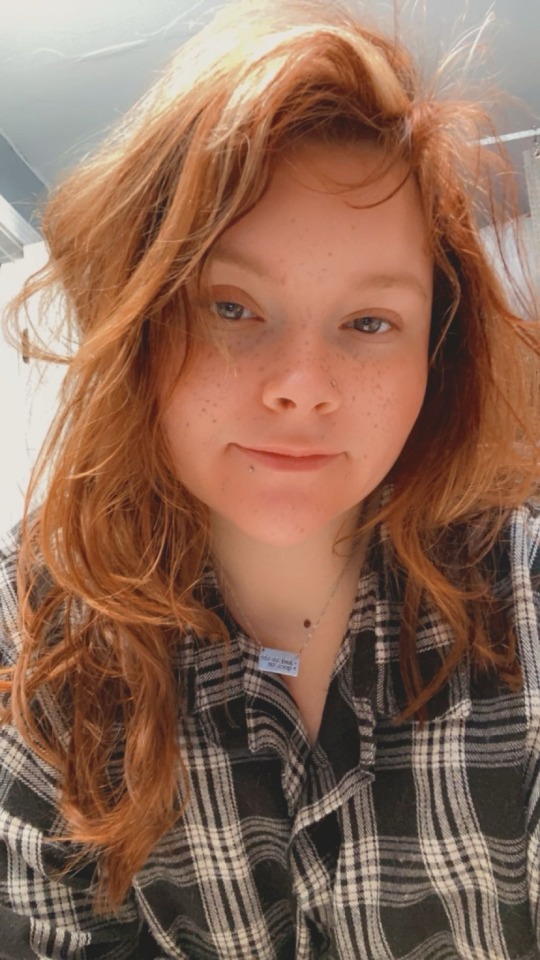
Morning losers 💕
6:25am EST
This is how I look right when I wake up…everyone thinks you’re hot until they see you in the morning 😂😂
I slept pretty well last night was pissed when my alarm went off for work..not thrilled. I do have dunks for breakfast tho so at least there’s that.
I’m a true new englander-I drink iced coffee year round lol
Iced caramel swirl cream only
Hoping I have the energy to ride after work but who knows I have to work one client horse before I can ride.
Hope you slept well and have a great Saturday!
Love you💕
Remember
You are loved
You are wanted
Drink your water
Take your meds
Be kind to yourself
#18+ blog#manic pixie dream girl#girls with piercings#personal#mental illness#mental health#bipolor#mentalheathawareness#me#hypomania#mental health awareness#bipolar 2#morning selfie#morning losers#morning check in#coffetime#need coffee#coffee time#iced coffee#selfie#im exhausted#ginger#red head#red hair#inbox open#asks open#tumblr girl#girl blogger
24 notes
·
View notes
Text
affirm:
“I am just as important as my goals.”
i’m no longer punishing myself for not meeting my goals, for not performing on a level i think i should be, for not being able to work hard enough, for needing sleep, for needing breaks, for needing reassurance and support from myself.
i can’t grow if i’m constantly neglecting my roots. my rest is just as important as my ‘hustle mode’. taking care of my mental health is just as important as taking care of my to-do list. making sure i don’t neglect myself is just as important as making sure i am meeting the goals i set for myself.
i am just as important as my goals.
#mental heath support#mentalheathawareness#mental heath awareness#mental health awareness#positive mental attitude#mental health#mental illness#self healing#self discipline#self help#self care#self love#self improvement#affirmations#affirm and persist#law of attraction#loa tumblr#healthylifestyle#healthyliving#healing#healing spiritual#health and wellness#health wealth happiness#health & fitness#growth#personal improvement
16 notes
·
View notes
Text
Things I'd love for the Internet to leave in 2023:
• misusing the word "delusional" or saying "delulu"
• public freakout videos that are just someone displaying psychotic symptoms
• "I'm in your walls" and other paranoia triggering "jokes"
• schizoposting
• misusing the word "psychotic"
• baiting and triggering people online who are openly psychotic or displaying psychotic symptoms
• excluding schizo-spec and psychotic people from any neurodiversity/mental illness awareness
Let's just all try to be better to schizo-spec and psychotic people. And hold others accountable as well.
#2024#new years eve#tw im in your walls#tw paranoia#mental illness#nd#schizophrenia#neurodivergent#schizophrenic#psychosis#actuallyschizophrenic#mental health awareness#pseriouslypsychotic#schizo-spec
27K notes
·
View notes
Text
I talk to many people who say things like "oh I have trauma but I don't have PTSD", but then when I talk to them a little more I realize that they most likely do, they just can't recognize it as such due to how lacking PTSD awareness is, even beyond the whole "it's not just a veteran's disorder" thing.
The main reason they think they don't have PTSD usually has to do with flashbacks and nightmares, either they have one but not the other or have neither. But here's the thing, those are only two symptoms out of the 23-odd recognized symptoms. Flashbacks and nightmares are two of the five symptoms under Criterion B (Intrusion), which you only need one of for a diagnosis. The other three symptoms are unwanted upsetting memories, emotional distress after being reminded of trauma and physical reactivity after being reminded of trauma (i.e. shaking, sweating, heart racing, feeling sick, nauseous or faint, etc). Therefore you can have both flashbacks and nightmares, one but not the other, or neither and still have PTSD.
In fact, a lot of the reasons people give me for why they don't think they have PTSD are literally a part of the diagnostic criteria.
"Oh, I can barely remember most parts of my trauma anyway." Criterion D (Negative Alterations in Cognition and Mood) includes inability to recall key features of the trauma.
"Oh but I don't get upset about my trauma that often because I avoid thinking of it or being around things that remind me of it most of the time." Criterion C (Avoidance) includes avoiding trauma-related thoughts or feelings and avoiding trauma-related external reminders, and you literally cannot get diagnosed if you don't have at least one of those two symptoms.
"Oh I just have trouble getting to sleep or staying asleep, but I don't have nightmares." Criterion E (Alterations in Arousal and Reactivity) includes difficulting sleeping outside of nightmares.
"But I didn't have many/any trauma symptoms until a long time after the trauma happened." There's literally an entire specification for that.
Really it just shows how despite being one of the most well-known mental illnesses, people really don't know much about PTSD. If you have trauma, I ask you to at least look at the criteria before you decide you don't have PTSD. Hell, even if you don't have trauma, look at the criteria anyway because there are so many symptoms in there that just are not talked about.
PTSD awareness is not just about flashbacks and nightmares.
#ptsd#post traumatic stress disorder#cptsd#complex post traumatic stress disorder#complex ptsd#trauma#actually ptsd#actually cptsd#mental illness#mental health#mental health awareness#ptsd awareness#cptsd awareness#neurodivergent#ptsd thoughts#awareness#important#mentally ill#actually mentally ill#psychology
47K notes
·
View notes
Text
“what was the most pain you have ever felt”
healing from someone, i once thought i would heal with
#aesthetic#feelings#inspiration#inspring quotes#mental health#mental health awareness#literature#life quotes#words#thoughts#poetry#poem#original poem#short poem#poems and poetry#poems and quotes#poems on tumblr#prose#heartbreak#i miss you#life#i miss him#I love you#writing#relationship#Relationship Quotes#relatable quotes#relatable#quotes#spilled ink
6K notes
·
View notes
Text
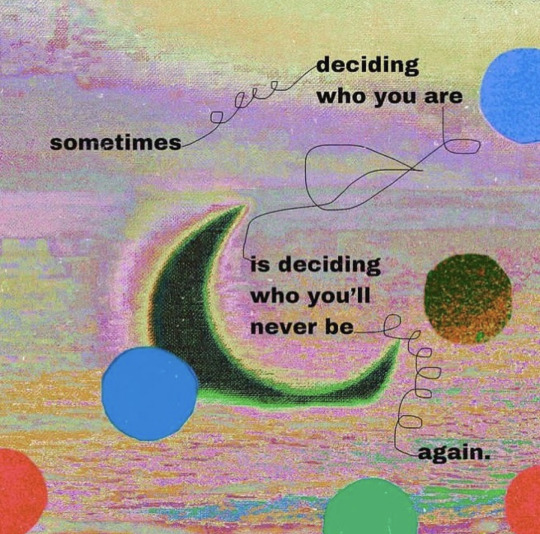
#mental health memes#mental health#mental health matters#mental health awareness#self care#self care reminder
8K notes
·
View notes
Text
friendly reminders:
you don't have to be productive every day
you are worthy even if all you did today was get out of bed
there are people out there who care about you
your existence makes a difference
if something bothers you, then it bothers you. no one has the right to tell you otherwise
you are allowed to take up space
there is no 'right way' to grieve
you cannot put a time limit on emotions
your likes and interests are valid and they matter
it's okay to take your time in doing things. not everyone can do everything at the same pace
#mental health#reminders#mental health awareness#mental health support#mental health issues#mental health reminders#mental health problems#therapy#coping#coping mechanisms#mental ill health#mental illness#wellbeing#wellness#motivation#productivity#optimism#positivity
20K notes
·
View notes
Text
To anyone who was suicidal at age 14 or younger, here’s your permission to grieve. Here’s your permission to not joke about it or just flat out ignore it. Here’s your permission to acknowledge that lost child who felt way more pain than any child should ever feel. You’re allowed to cry for that child, whether you healed or are still suffering the same thoughts. Finally allow yourself to grieve for that child filled with undeserved hurt.
#I feel like I’ve never done this and I want to start to#mental health#positivity#self care#mental illness#self help#recovery#pro recovery#ed recovery#pro a4a#ed bllog#ed not sherran#skinnni#actually cptsd#actuallytraumatized#actually dissociative#actually ptsd#mental health awareness#childhood trauma#traumacore#bpd#i wanna be weightless#self h@rm#baby cvts#self mutilation#self destruction#tw depressing stuff#tw depressing thoughts#mentally fucked
10K notes
·
View notes
Text
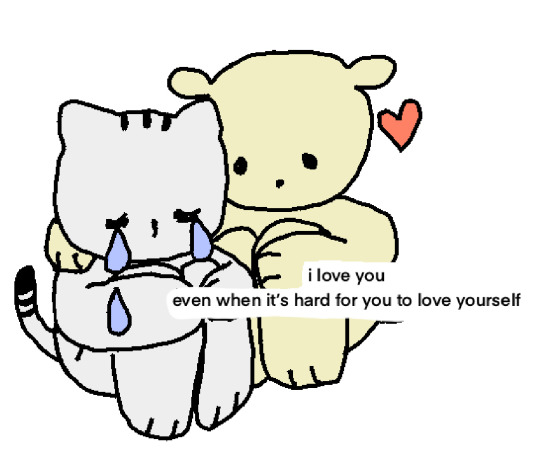
4K notes
·
View notes
Text
Please, if you can, take a moment to read and share this because I feel like I'm screaming underwater.
NPD (Narcissistic Personality Disorder) stigma is rampant right now, and seems to be getting progressively worse. Everyone is using it as a buzzword in the worst ways possible, spreading misinformation and hatred against a real disorder.
I could go on a long time about how this happened, why it's factually incorrect (and what the disorder actually IS), why it's harmful, and the changes I'd like to see. But to keep this concise, I'll simply link to a few posts under the cut for further reading.
The point of this post is a plea. Please help stop the spread of stigma. Even in mental health communities, even around others with personality disorders, in neurodivergent "safe" spaces, other communities I thought people would be supportive in (e.g. trans support groups, progressive spaces in general), it keeps coming up. So I'm willing to bet that a lot of people on this site need to see this.
Because it's so hard to exist in this world.
My disorder already makes me feel as if I'm worthless and unlovable, like there's something inherently wrong and damaged about me. And it's so much harder to fight that and heal when my daily life consists of:
Laughing and spending time with my friends, doing my utmost best to connect and stay present and focused on them, trying to let my guards down and be real and believe I'm lovable- when suddenly they throw out the word "narcissist" to describe horrible people or someone they hate, or the conversation turns to how evil "people with narcissistic personality disorder" are. (Seriously, you don't know which of your friends might have NPD and feels like shit when you say those things & now knows that you'd hate them if you knew.)
Trying to look up "mental health positivity for people with npd", "mental health positivity cluster bs", only to find a) none of that, and b) more of the same old vile shit that makes me feel terrible about myself.
Having a hard time (which is constant at this point) and trying to look up resources for myself, only to again, find the same stigma. And no resources.
Not having any clue how to help myself, because even the mental health field is spitting so much vitriol at people with DISORDERS (who they're supposed to be helping!) that there's no solid research or therapy programs for people like me.
Losing close friends when they find out, despite us having had a good relationship before, and them KNOWING me and knowing that I'm not like the trending image of pwNPD. Because now they only see me through the lens of stigma and misinformation.
Hearing the same stigma come up literally wherever I go. Clubs. Meetings. Any online space. At the bus stop. At the mall. At a restaurant. At work. Buzzword of the year that everyone loooves loudly throwing around with their friends or over the phone. Feels awesome for me, makes my day so much better/s
I could go on for a long time, but I'm scared no one will read/rb this if it gets too much longer.
So please. Stop using the word "narcissist" as a synonym for "abusive".
Stop bringing up people you hate who you believe to have NPD because of a stigmatizing article full of misinformation whenever someone with actual NPD opens their mouth. (Imagine if people did that with any other disorder! "Hey, I'm autistic." "Oh... my old roommate screamed at me whenever I made noise around him, and didn't understand my needs, which seems like sensory overload and difficulty with social cues. He was definitely autistic. But as long as you're self-aware and always restraining your innate desire to be an abusive asshole, you're okay I guess, maybe." ...See how offensive and ignorant that is?)
Stop preventing healthcare for people with a disorder just because it's trendy to use us as a scapegoat.
If you got this far, thank you for reading, and please share this if you can. Further reading is under the cut.
NPD Criteria, re-written by someone who actually has NPD
Stigma in the DSM
Common perception of the DSM criteria vs how someone may actually experience them (Keep in mind that this is the way I personally experience these symptoms, and that presentation can vary a lot between individuals)
"Idk, the stigma is right though, because I've known a lot of people with NPD who are jerks, so I'm going to continue to support the blockage of treatment for this condition."
(All of these were written by me, because I didn't want to link to other folks' posts without permission, but if you want to add your own links in reblogs or replies please feel free <3)
#actuallynpd#signal boost#actuallyautistic#mental health awareness#narcissistic personality disorder#people also need to realize that mental health professionals aren't immune from bias#(it really shouldn't come as a shock that the mental health field has a longstanding pattern of misunderstanding and mistreating ppl who ar#mentally ill or otherwise ND)#the first therapist i brought up NPD to like. literally pulled out the DSM bc she could barely remember the criteria. then said that there'#no way I have it because I have low self-esteem lmaoooooo#anyway throwback to being at work and chatting with a co-worker. and the conversation turning to mental health. and him saying that#he tries to stay informed and be aware and supportive of mental health conditions & that he doesn't want to be ignorant or spread harmful#misinformation. and then i mentioned that i do a lot of research into mental health stuff and i listed a bunch of things. which included#several personality disorders. one of which was NPD.#and after listening to my whole ass list he zeroed in on the NPD and immediately started talking about how narcissists are abusive and#he knew someone who had NPD and how the person who had it had an addiction and died from the addiction in a horrible way and he#was glad he did#fun times#or when i decided to be vulnerable and talk abt my self-criticism/self-hatred bc i knew my friends also struggled w that and i wanted to#support them by sharing my own coping methods. and they both(separately!) started picking and prodding at my npd through the lens of stigma#bc i'd recently opened up to them abt having it. they recognized self-hatred as a symptom and still jumped on me for it. despite me#trying to share hurt vulnerable parts of myself to help them and connect with them.#again..... fun times
7K notes
·
View notes
Text
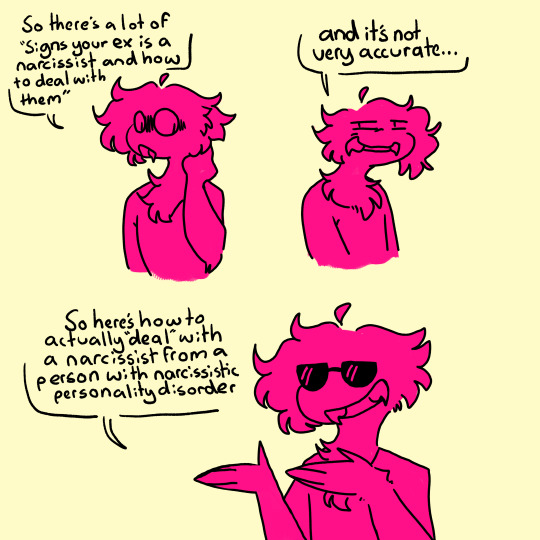

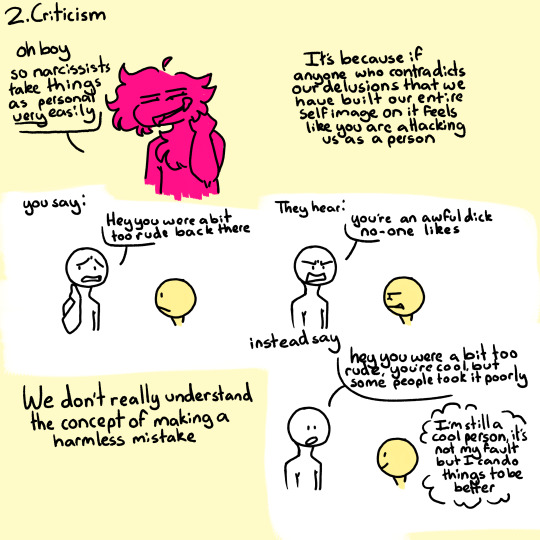



Inspired by @arrgh-whatever's post on helping ppl with BPD
Edit bc I forgot to add this: Being vulnerable means smth different for different ppl, something that could read as being vulnerable to you can read as just another Tuesday for someone else
ID under the cut
[ID: a simply-drawn comic, narrated by a person coloured-in in pink.
Panel 1: The pink person narrates: "So there's a lot of "signs your ex is a narcissist and how to deal with them" and it's not very accurate. So here's how to actually "deal" with a narcissist from someone with narcissistic personality disorder."
Panel 2: This panel has the heading: "1. Supply." The pink person narrates: "People with NPD have very fragile self-esteem, and supply is what keeps us from having a mental breakdown. Supply can be many things, but often attention and praise are effective. Stuff like "Wow! That's super cool!!" can go a long way." A person is shown saying this to another person, who smiles.
Panel 3: This panel has the heading: "2. Criticism." The pink person narrates: "Oh boy. So narcissists take things as personal very easily. It's because if anyone contradicts our delusions that we have built our entire self-image on, it feels like you are attacking us as a person." There is an example shown, where one person says "hey, you were a bit too rude back there," but the other person hears "You're an awful dick no-one likes." The alternative manner of phrasing is suggested as "Hey, you were a bit too rude. You're cool, but some people took it poorly." The second person in this example thinks "I'm still a cool person. It's not my fault, but I can do things to be better." The narrator continues, "We don't really understand the concept of a harmless mistake."
Panel 4: This panel has the heading: "3. Boundaries." The pink person narrates: "With narcissists, setting down strict boundaries is very important. 1. Knowing we have hurt you because you didn't set down boundaries can really upset and annoy us because the delusions that we can do no wrong and know you best get broken. 2. If you let us break boundaries, it can lead us to see you as "weak" and devalue you. Communication is key."
Panel 5: This panel has the heading: "4. Anger." The pink person narrates: "So people with NPD tend to be prone to anger. This is a defense mechanism, because to us, it's either facing the inaccuracies of our delusions and having a mental breakdown, or blaming something else. We do not mean to lash out; we just don't have the skills to cope properly. You can help by: 1. Letting us express out emotions without judgement; 2. giving us praise or attention; and 3. Distracting us from what angered us." Each example of how to help is accompanied by a small cartoon.
Panel 6: This panel has the heading: "5. Other NPD things!" The pink person narrates: "'Love bomb, devalue, discard' is actually: we are genuinely obsessed with you and want you to recognize us as cool, we lose that obsession and move on, we feel threatened in some way and lash out. We can't really handle being seen as vulnerable. We take sympathy and empathy as pity and pity as you telling us we're weak. Not acknowledging we're being vulnerable and acting as if nothing is wrong can be helpful in these situations. People with NPD have a very warped view of reality. We do not mean to hurt you and often do not realise we have. Remember, this won't work for everyone, and talking is very important."
/end ID]
Ty to @aromanticsky for the id
#garlic breath#pasta scribbles#mental health#mental health awareness#npd safe#actually narcissistic#actually npd#narcissistic personality disorder#npd#actually mentally ill#actually neurodivergent#mental illness#neurodivergent#art#my art#cluster b#cluster b safe#npd info#cluster b info#cluster b awareness
2K notes
·
View notes
